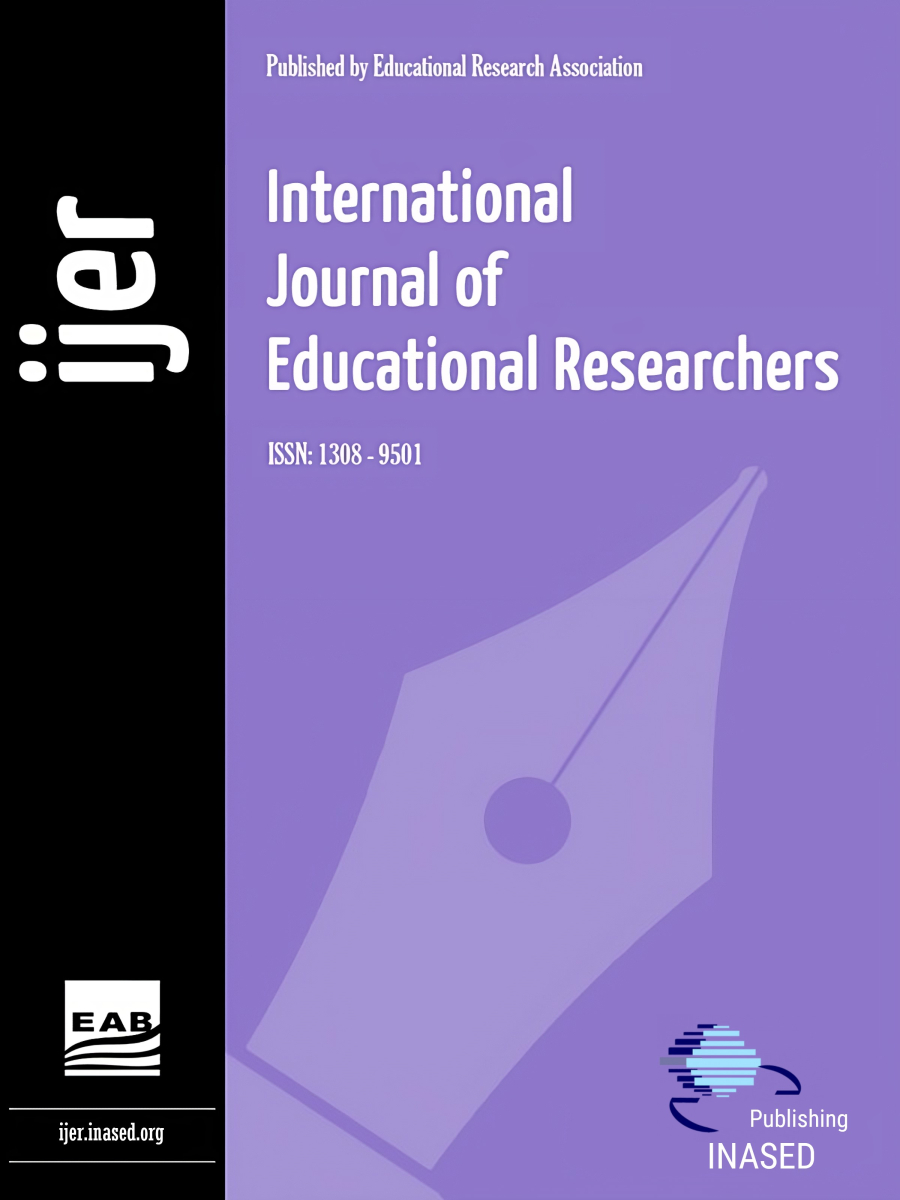- Alper, A. ve Gülbahar, Y. (2009). Trends and issues in educational technologies: A review of recent research in TOJET. Turkish Online Journal of Educational Technology, 8 (2), 124-135. [Google Scholar]
- Aydın, A. ve Uysal, Ş. (2014). Türkiye’de eğitim yönetimi teftişi planlaması ve ekonomisi alanındaki doktora tezlerinin incelenmesi. Abant İzzet Baysal Üniversitesi Eğitim Fakültesi Dergisi, 14 (1), 177-201. [Google Scholar]
- Çalık, M., Ünal, S., Coştu, B. ve Karataş, F. Ö. (2008). Trends in Turkish science education. Essays in Education, [Special edition] 23-45. [Google Scholar]
- Çiltaş, A., Güler, G. ve Sözbilir, M. (2012). Türkiye’de matematik eğitimi araştırmaları: bir içerik analizi çalışması. Kuram ve Uygulamada Eğitim Bilimleri, 12 (1), 565-580. [Google Scholar]
- De Vries, M.J. (2004) Trends in technology education research, Research Trends in Science, Technology and Mathematics Education Review talks delivered at epiSTEME-1, an international conference to review research on Science, Technology and Mathematics Education December 13-17, 2004, International Centre, Goa, 175-196 [Google Scholar]
- Dönmez, B. (1998). Eğitim fakültelerinin yeniden yapılandırılması üzerine bazı eleştiriler. Kuram ve Uygulamada Eğitim Yönetimi Dergisi, 13, 71-78. [Google Scholar]
- Englund, T. (2006). New trends in Swedish educational research. Scandinavian Journal of Educational Research 50 (4), September, 383-396. [Google Scholar]
- Erdoğmuş, F. U., ve Çağıltay, K. (2009). Türkiye’de eğitim teknolojileri alanında yapılan master ve doktora tezlerinde genel eğilimler. Akademik Bilişim, Akademik Bilişim Konferansı Bildirileri, Harran Üniversitesi, 389-393. [Google Scholar]
- Fazlıoğulları, O. ve Kurul, N. (2012). Türkiye’deki eğitim bilimleri doktora tezlerinin özellikleri. Mehmet Akif Ersoy Üniversitesi Eğitim Fakültesi Dergisi, 24, 43-75. [Google Scholar]
- Göktaş, Y., Hasançebi, F., Varışoğlu, B., Akçay, A., Bayrak, N., Baran, M. ve Sözbilir, M. (2012). Trends in educational research in Turkey: A content analysis. Educational Sciences: Theory & Practice, 12 (1), 455-459. [Google Scholar]
- Gömleksiz, M.N. ve Bozpolat, E. (2013). Eğitim programları ve öğretim alanındaki lisansüstü tezlerin değerlendirilmesi. The Journal of Academic Social Science Studies, 6 (7), 457-472. [Google Scholar]
- http://www.shanghairanking.com/World-Universitv-Rankings/Universitv-of-Granada.html erişim tarihi: 17.08.2014. [Google Scholar]
- http://www.ugr.es/en/ erişim tarihi: 10.07.2014. [Google Scholar]
- Küçükoğlu, A. ve Ozan, C. (2013). Sınıf öğretmenliği alanındaki lisansüstü tezlere yönelik bir içerik analizi. Uluslararası Avrasya Sosyal Bilimler Dergisi, 4 (12), 27-47. [Google Scholar]
- Matthews (2004) The ımpact of ıdealist and relativist philosophies of science on contemporary science education research, Research Trends in Science, Technology andMathematics Education Review talks delivered at epiSTEME-1, an international conference to review research on Science, Technology and Mathematics Education December 13-17, 2004, International Centre, Goa, 197-234 [Google Scholar]
- Mihalca, L. ve Miclea, M. (2007). Current trends in educational technology research. Cognipe, Creier, Comportament / Cognition, Brain, Behavior, XI (1) (March), 115 - 129. [Google Scholar]
- Obonya, P ve Toure, K (2003). Emerging trends in research on the quality of education, Educational Research Network for West And Central Africa, E R N W A C A, Preliminary Report, Bamako, MALI [Google Scholar]
- Ozan, C. ve Köse, E. (2014). Eğitim programları ve öğretim alanındaki araştırma eğilimleri. Sakarya University Journal of Education, 4 (1), 116-136. [Google Scholar]
- Öğülmüş, S. (1991). İçerik çözümlemesi. Ankara Üniversitesi Eğitim Bilimleri Fakültesi Dergisi, 24 (1), 213¬228. [Google Scholar]
- Özdemir, M. (2010). Nitel veri analizi: sosyal bilimlerde yöntembilim sorunsalı üzerine bir çalışma. Eskişehir Osmangazi Üniversitesi Sosyal Bilimler Dergisi, Haziran, 11 (1), 323-343. [Google Scholar]
- Selçuk, Z., Palancı, M., Kandemir, M. ve Dündar, H. (2014). Eğitim ve Bilim dergisinde yayınlanan araştırmaların eğilimleri: içerik analizi. Eğitim ve Bilim, 39 (173), 430-453. [Google Scholar]
- Sözbilir, M. ve Kutu, H. (2008). Development and current status of science education research in Turkey. Essays in Education [Special issue], 1-22. [Google Scholar]
- Stacey K. (2004). Trends in mathematics education research:the example of algebra education, Research Trends in Science, Technology and Mathematics Education Review talks delivered at epiSTEME-1, an international conference to review research on Science, Technology and Mathematics Education December 13-17, 2004, International Centre, Goa, 147-176 [Google Scholar]
- Şahin, E.Y., Kana, F. ve Varışoğlu, B. (2013). Türkçe eğitimi bölümlerinde yapılan lisansüstü tezlerin araştırma eğilimleri. International Journal of Human Sciences, 10 (2), 356-378. [Google Scholar]
- Tavşancıl, E ve Aslan, A. E. (2001). İçerik analizi ve uygulama örnekleri. İstanbul: Epsilon. [Google Scholar]
- Treagust, D. (2004). Trends in science education research, Research Trends in Science, Technology and Mathematics Education Review talks delivered at epiSTEME-1, an international conference to review research on Science, Technology and Mathematics Education December 13-17, 2004, International Centre, Goa, 125-146 [Google Scholar]
- Ukpong, I ve Udoh, N.S. (2012). Functıonal cumculum development and qualıtatıve education for values, knowledge, skıll and natıonal development The Nigerian Academic Forum 23 (1), November, 1-9. [Google Scholar]
- Yalçın, N., Bilican, S., Kezer, F. ve Yalçın, Ö. (2009). Hacettepe Üniversitesi Eğitim Fakültesi dergisinde yayımlanan makalelerin niteliği: İçerik analizi. I. Uluslararası Eğitim Araştırmaları Kongresi. (1-3 Mayıs 2009) Çanakkale. [Google Scholar]
- Yalçınkaya, Y. ve Özkan, H.H. (2012). 2000-2011 yılları arasında eğitim fakülteleri dergilerinde yayımlanan matematik öğretimi alternatif yöntemleri ile ilgili makalelerin içerik analizi. Süleyman Demirel Üniversitesi Sosyal Bilimler Enstitüsü Dergisi 2 (16), 31-45. [Google Scholar]
- Yıldız, A. (2004). Türkiye’deki yetişkin eğitimi araştırmalarına toplu bakış. Ankara Üniversitesi Eğitim Bilimleri Fakültesi Dergisi, 37 (1), 78-97. [Google Scholar]
|


